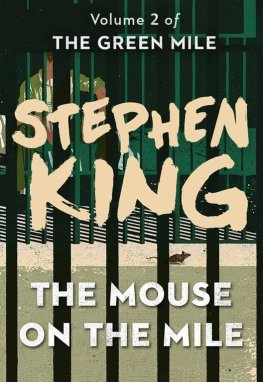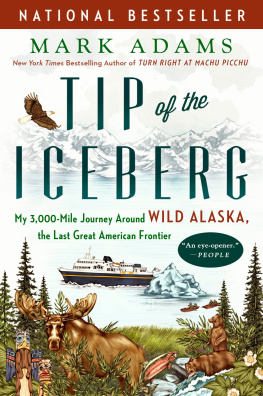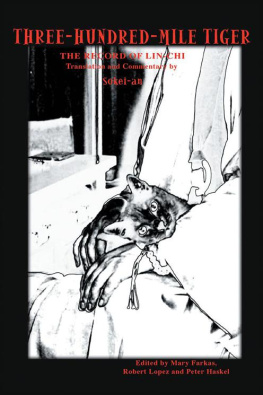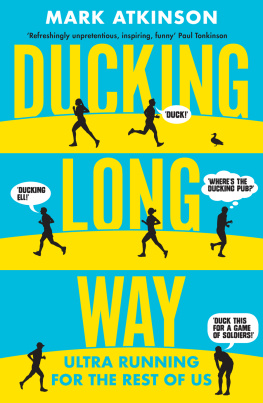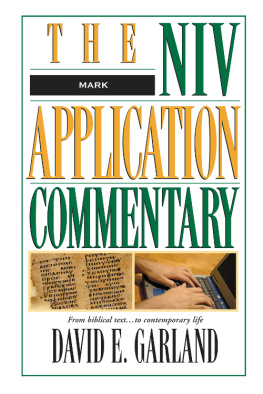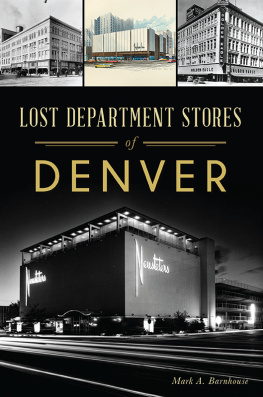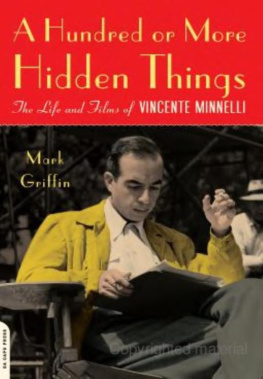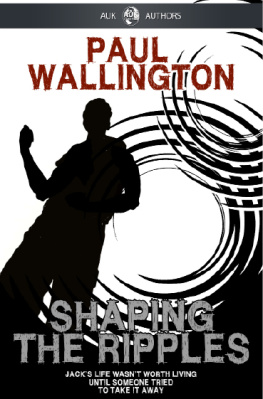Mark Wallington - Five Hundred Mile Walkies
Here you can read online Mark Wallington - Five Hundred Mile Walkies full text of the book (entire story) in english for free. Download pdf and epub, get meaning, cover and reviews about this ebook. year: 2014, publisher: Random House, genre: Detective and thriller. Description of the work, (preface) as well as reviews are available. Best literature library LitArk.com created for fans of good reading and offers a wide selection of genres:
Romance novel
Science fiction
Adventure
Detective
Science
History
Home and family
Prose
Art
Politics
Computer
Non-fiction
Religion
Business
Children
Humor
Choose a favorite category and find really read worthwhile books. Enjoy immersion in the world of imagination, feel the emotions of the characters or learn something new for yourself, make an fascinating discovery.
- Book:Five Hundred Mile Walkies
- Author:
- Publisher:Random House
- Genre:
- Year:2014
- Rating:4 / 5
- Favourites:Add to favourites
- Your mark:
- 80
- 1
- 2
- 3
- 4
- 5
Five Hundred Mile Walkies: summary, description and annotation
We offer to read an annotation, description, summary or preface (depends on what the author of the book "Five Hundred Mile Walkies" wrote himself). If you haven't found the necessary information about the book — write in the comments, we will try to find it.
Five Hundred Mile Walkies — read online for free the complete book (whole text) full work
Below is the text of the book, divided by pages. System saving the place of the last page read, allows you to conveniently read the book "Five Hundred Mile Walkies" online for free, without having to search again every time where you left off. Put a bookmark, and you can go to the page where you finished reading at any time.
Font size:
Interval:
Bookmark:
Contents
Boogie is an unattractive but street-wise mongrel from Stockwell, used to travelling everywhere on London Transport. His two-legged companion is Mark. This is a heroic study of survival against the odds, as together they take a journey, up hill and down dale, with rucksacks full of Kennomeat, along Britains longest coastal footpath from Somerset to Devon, from Cornwall to Dorset.
Mark Wallington was born in Swanage in Dorset in 1953. He worked for a while as a gardener in London before becoming a scriptwriter and a journalist. In 1982 he walked the South West Coastal Path and his subsequent book, 500 Mile Walkies, became a bestseller. In 1992 Mark Wallington published his novel The Missing Postman and then wrote the script for the award-winning television play starring James Bolam. He is much sought-after as a film and television writer, working from his home in the High Peak in Derbyshire, where he keeps a truly wonderful garden. He is married with two children.
Many thanks are due to the following, without whose help I might still have gone on this trip but would never have returned: to Sean Neylon for the loan of his dog and a spare T-shirt; to Sue Fields for the stove and rucksack; to Pat Allen for the sleeping bag; to Steven Danos for the tent; to my grandmother for the spending money; to Mrs Donaldson for buying me the boots; and to Dick Fiddy for lending me his spoon.
Thanks also to Steve Backhand Smith, to Jes Hulme and Gwen, and thanks and lots of other things to Toni.

SOME TOWNS INSPIRE. They have an air of adventure and a sense of urgency. They are mysterious and just a little frightening. You know as soon as you walk into them they are special places.
Minehead isnt one of them. Vladivostok is, but Minehead isnt. I was in Minehead.
I was sitting in a beach shelter at the end of the promenade. According to the felt-tipped graffiti, Michael and Donna had had a good time there in June 1980; further along the bench Pete and Sarah had got it together in July 1981; then in September of the same year Gary had done something on his own halfway up the wall.
A beach shelter of experience then. Unfortunately, my business there involved nothing more promiscuous than breakfast: Weetabix and bananas, and I ate in silence, largely because I was on my own, also because I was contemplating my sanity and if you do that out loud the chances are youre mad.
A milkfloat passed with a rattle and a hum. At the other end of the promenade the machine gun nests of Butlins loomed out of the mist and were gone. I stared into my bowl. In two mouthfuls time, I intended to cross the road in front of me and follow the footpath that led off up an alleyway to the top of North Hill. There, I planned to turn sharp left and continue walking, ever faithful to the coast, until Id trekked around the entire South-west peninsula and come to rest on the sheltered shores of Poole Harbour in Dorset, five hundred miles away.
Simple enough, and four months previously on a January evening as I sat before maps and books in the warmth of the Swiss Cottage Reference Library, it had all seemed like an exceptionally good idea. Now, at seven oclock on a grey morning in early May at the bottom of North Hill, it seemed like a stupid one.
An eye of blue peeped through the mist and closed again. Minehead yawned, stretched, scratched, rolled over and went back to sleep. Id arrived there the previous evening and had hoped the place might fire my enthusiasm. Id imagined it might have the feel of a border town, the embrace of a seething port full of bars with low ceilings and characters with eye patches and wooden legs. But no. Minehead was a collection of red-bricked guest houses and white soundless bungalows and Somerset County Council signposts telling you not to do things. Quite simply, it lacked the basic ingredients of an embarkation point think of Vladivostok and the imagination is immediately gripped by the intrigue of the Trans-Siberian Railway. Minehead has a similar sort of relationship with Butlins.
I scraped my bowl clean, licked the spoon and packed up. I took a deep breath, rose to my feet, swung my rucksack over my shoulders, surveyed the sheer face of North Hill, took another deep breath and then slumped back onto the bench.
Five hundred miles. I tried to translate the distance but it was impossible. It was a hundred thousand double-decker buses laid end to end. It was like walking from 20 Inglewood Road, London NW6 to the intercontinental all-night Paki deli on West End Lane and back, two thousand times. If you stood the path upright it would be a hundred times higher than Everest. It was, more to the point, fifty times further than Id ever walked before. I decided to have another Weetabix.
Immediately, there was a black flash and there at my feet sat a strange dog-like creature auditioning for the title role in Oliver Twist: head cocked at an angle of forty-five degrees, one paw hanging limply, eyes big and wet as puddles, an empty plastic bowl clenched in teeth, an expression that says: If you dont give me half of what youre eating this very minute, I shall surely slash my wrists.
It was Boogie, my intensely unattractive travelling companion. A moment or two earlier hed been a black dot in the distance, zig-zagging down the promenade, his ever probing nose propelling an empty bowl of Winalot before him. Now, thanks to the bizarre audio equipment lodged inside his skull incapable of hearing a dog whistle blown in his ear, yet sensitive to the sound of a cereal packet being opened at a range of two miles he was at my side, subjecting me to this outrageous display of overacting.
When the pool of saliva around my feet was ankle deep I could stand it no longer. With tears in my eyes I poured him another bowl of Winalot and flooded it with milk. His head dived in with a splash and for a moment I think I may have felt a twinge of pity for this little Cockney doggie with the rodent features. A walk to him meant once round the block and even that ran the risk of a fifty-pound fine; any greater distance he faredodged on the Underground. The only clue hed had to the expedition ahead of him was a cry of Walkies! as Id led him out of the house the day before.
Then, slowly, his face emerged from the pasteurised depths, dripping, a look of suspicion dawning. You could see the mental recorder inside his minute brain rewind until it arrived at the last occasion hed been treated to two breakfasts. Of course! It was the time hed been lured to the vet. There a very nice young man had greeted him with a pat on the head, stroked him and called him a good boy and then rammed a polythene-gloved hand right up his rectum. Boogies eyes had inflated, his ears steamed and since then hes been reluctant to accept anything other than cold tea for breakfast unless hes got his back to the wall, and I cant say I blame him.
Now he stared at the bowl, confused. He stared at me. He stared back at the bowl. He glanced over his shoulder. He picked up the bowl in his teeth and backed nonchalently away. There was a scamper of toe-nail on concrete and once more he was a black dot in the distance.
The best journeys have no motives. They are capricious affairs, made for no other reason than they exist, for no other goal than fun.
But try telling people that. Theyll say, Yes, but why are you doing it? They want a declaration, an objective that gives the trip a plot; something of the To prove Vikings could have done it in open boats, ilk.
Next pageFont size:
Interval:
Bookmark:
Similar books «Five Hundred Mile Walkies»
Look at similar books to Five Hundred Mile Walkies. We have selected literature similar in name and meaning in the hope of providing readers with more options to find new, interesting, not yet read works.
Discussion, reviews of the book Five Hundred Mile Walkies and just readers' own opinions. Leave your comments, write what you think about the work, its meaning or the main characters. Specify what exactly you liked and what you didn't like, and why you think so.


